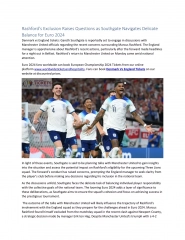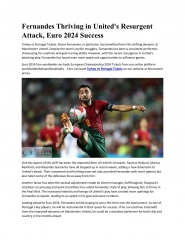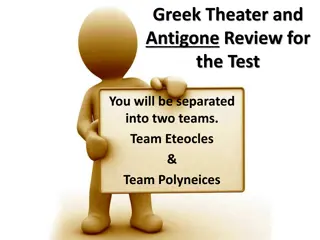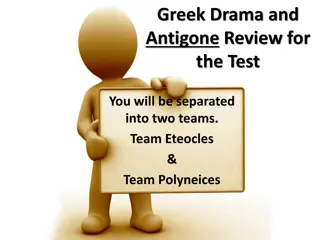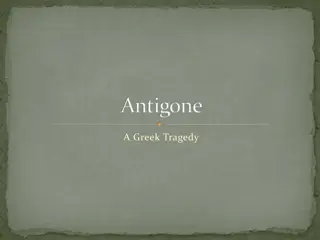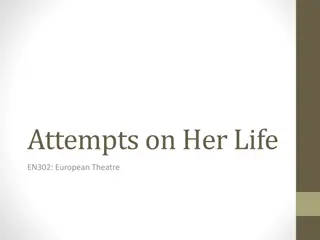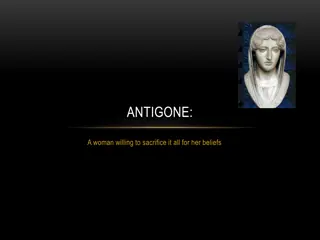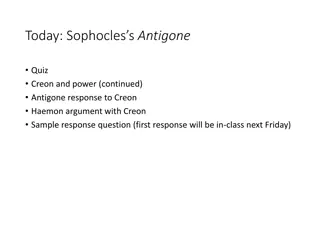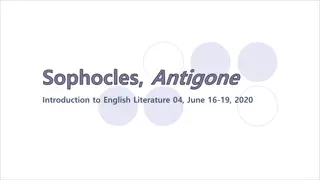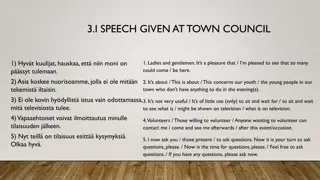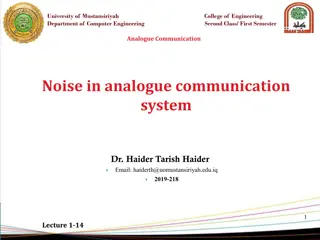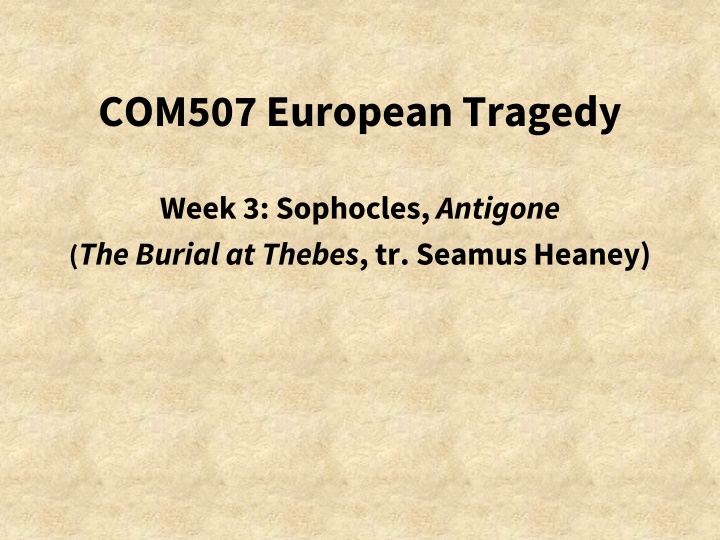
European Tragedy: Sophocles' Antigone - Hegel's Insights on Conflicting Belief Systems
Dive into Hegel's perspectives on tragedy through the lens of Sophocles' Antigone, exploring conflicting belief systems, justifiable powers, and the collision of opposing positions in this timeless work of literature. Gain a deeper understanding of how Antigone and Creon's justified stances embody a clash between divine law and political authority, shedding light on the complexities of human history and ethical obligations.
Download Presentation

Please find below an Image/Link to download the presentation.
The content on the website is provided AS IS for your information and personal use only. It may not be sold, licensed, or shared on other websites without obtaining consent from the author. If you encounter any issues during the download, it is possible that the publisher has removed the file from their server.
You are allowed to download the files provided on this website for personal or commercial use, subject to the condition that they are used lawfully. All files are the property of their respective owners.
The content on the website is provided AS IS for your information and personal use only. It may not be sold, licensed, or shared on other websites without obtaining consent from the author.
E N D
Presentation Transcript
COM507 European Tragedy Week 3: Sophocles, Antigone (The Burial at Thebes, tr. Seamus Heaney)
Plan for the session Hegel on tragedy and Antigone: conflicting belief systems Lacan on Antigone: desire and the law Butler on Antigone: bringing back politics Difficulty relevance and prioritizing Role of QMplus pages 1. 2. 3.
Hegel on tragedy 1 Tragedy seen as intellectual rather than emotional Contrast with Aristotle Offers a way of thinking: cause and effect; can teach social lessons Hegel s view of human history (highly simplified): Teleological, i.e. progresses towards a goal Namely, the eventual achievement of universal freedom Progress involves increasing self-consciousness, i.e. reflecting on what we do and thereby seeing an increasingly big picture (PSp. 218) Agonistic, i.e. involves conflict between individuals, states, cultures, etc. Also applies to belief systems, which are transformed or superseded through battles of ideas Abstract, i.e. general progress counts for much more than individual human beings
Hegel on tragedy 2 Relationships between individuals and large impersonal forces Stages a collision between conflicting belief systems (HA p. 1162) NB these are equally justified powers (HAp. 1213): an individual s decision, justified by the object he [sic] aims at, is carried out in a one-sided and particular way, and therefore in specific circumstances, which already carry in themselves the real possibility of conflicts, he injures another and equally moral sphere of the human will. To this sphere another person clings as his own actual pathos and in carrying out his aim opposes and reacts against the former individual. In this way the collision of equally justified powers and individuals is completely set afoot (ibid.) Not individuals making errors (Aristotle): the opposing individuals are both right (HA, p. 1214) Not good v evil, but two one-sided positions that each have good qualities (cf. HA, pp. 220-21)
Hegel on tragedy 3 Antigone is a paradigmatic case (HA, p. 1213): Both Antigone and Creon have a justified stance (HA, pp. 232-33, 1209) But being in the right involves denying the opposing position (HA, p. 464): Creon: defending the polis means violating divine law Antigone: defending the divine law means defying the law of the polis PSoutlines what these contrasting laws entail, in the context of human historical development see later slides The opposing figures also have obligations to each other, so they each oppose something of themselves: Antigone lives under the political authority of Creon [the present King] ; she is herself the daughter of a King [Oedipus] and the fianc e of Haemon [Creon's son], so that she ought to pay obedience to the royal command. But Creon too, as father and husband, should have respected the sacred tie of blood and not ordered anything against its pious observance. So there is immanent in both Antigone and Creon something that in their own way they attack, so that they are gripped and shattered by something intrinsic to their own actual being. (HA, pp. 1217-18)
Hegel on Antigone Both protagonists represent a valid principle HA translation uses the Greek word pathos(p. 232 n. 1) i.e. an overwhelming one-sided ethical commitment Lesson: must negotiate competing demands in a polis Not individual heroes, but clashing forces Implications for society as a whole Nobody is to blame but everybody suffers Hence tragic outcome is viewed in a particular way: Disaster for individuals: if a moral purpose is overcome, the protagonist who effectively embodies it has to be destroyed, either physically or morally (HA, p. 1217) But a sense of reconciliation at a higher level a form of (historical) justice in action (HA, pp. 1215-16) Questionable: ignores tragedy s undeniable emotional power satisfaction of the spirit , morally at peace (HA1215): really? What kind of spectator do we have to be to react to a tragedy this way?
Some key points from Hegel: PS pp. 219-20: identifies conflicting principles [manifested in Antigone] Human law: self-conscious (i.e. reflective) Aligned with the state, the universal, and (pp. 226-27) the male Divine law: immediate (i.e. unreflective) Aligned with the family/individual, nature, and the female pp. 220-23: relationship between these principles Human law reflects a higher level of development but the two principles are interdependent
Some key points from Hegel: PS 2 pp. 224-25: different kinds of family relationships Brother-sister relationships are unmixed (p. 224) i.e. no obligation for bringing a third party into the world, unlike conjugal or parental relationships [as assumed at this time] Hence for a sister to lose a brother is especially serious all the more so because she could gain another husband or son: Not for a husband, not even for a son Would I have broken the law. Another husband I could always find And have other sons by him if one were lost. But with my father gone, and my mother gone, Where can I find another brother, ever? (Burial, p. 40) So sisters have an especially close association with divine law Closer than parents or spouses, whose relationships aren t unmixed Closer than brothers, whose maleness associates them with human law
Some key points from Hegel: PS 3 pp. 225-29: interdependence of human and divine law: Neither exists in and of itself alone. Via the dynamism animating it, the human law emerges from the divine, and is even then returning to that from whence it came just as the law of the upper world emerges from the chthonic, the conscious from the unconscious, and mediation from immediacy. By contrast the power of the nether world has its actual reality above ground, becoming, in and through conscious existence, an actively engaged presence.(p. 226) Human law must be legitimated by an external principle, i.e. divine law Divine law can only be put into practice via human law pp. 229-32: when the interdependence breaks down Normally, the two laws are just automatically accepted But if one law is adopted as a conscious principle of action, it rejects the other (A loose analogy: deciding to support a football club or join a political party) Seeing right solely on one side, wrong on the other, the consciousness adhering to divine law views the other as sheer arbitrarily imposed human brutality; the one adhering to human law sees in the other the stubbornness and intractability of self-impacted existence-for-self. (p. 229) By this act [self-consciousness] relinquishes ethical definitiveness, the single- minded certainty of its embodying the straight truth, rending itself asunder into itself as agent vis- -vis a reality neg tiveof it. (p. 231)
Some key points from Hegel: PS 4 pp. 232-36: aspects of specific relevance for Antigone 56 Antigone is a case of one principle/law/pathos not respecting another HA, p. 1215: the chorus in a tragedy represents the two laws normal coexistence 58 This sort of conflict must result in the destruction of both sides Only in the equal subjection of both sides is unqualified right achieved, with ethical substance rising up in the form of an all- powerful and evenhanded fate, a neg tive power that consumes both. 59-61 Cf Eteocles and Polyneices: latter aligned with divine, not human, law 62-63 Antigone, and the principle she stands for, must succumb to the state As the law of things faint and dim, the unconscious spirit, prevailing not upon the earth but only in the nether realm, yields at first to the law and force holding sway in the realm of day. ( 62) But the state must suffer as a result The strength of the public spirit is rooted in the nether world: only when the communal substance is oblivious and mute only in the waters of forgetfulness does the certainty of a people sure of itself and self-affirming validate the oath binding all into one. [ ] With this the full realization of the public spirit turns into the very opposite, experiencing its supreme right as the most egregious of wrongs, its triumph as its downfall. ( 62-63)
Lacan on Antigone Parisian psychoanalyst: weekly seminar 1953-80 Annual seminars (effectively lecture series) published many years afterwards; texts based on audience notes References to Sophocles in Seminar VIIare often inaccurate; partly Lacan s errors, partly faulty editing Lacan s approach (in extremely basic terms): Notabout securing or accessing true identity ( ego-psychology ) Our self isn t fully accessible: it s fragmented We don t really know who we are: our sense of self is erroneous A necessary fiction to function properly in society The symbolic order : Language a pre-existing system (we don t speak language; it speaks us) Kinship structures Lacan sees these as working like language: the concept of father or sister-in-law means something in a particular culture (see Butler, p. 24) Structures that regulate sexual energies, so culture/society can function Inevitable mismatch between these structures and the self (see Butler, p. 25) Not humanist : human self is not a coherent source of value (Q1)
Lacan on Antigone2 Law and desire seen as central to the play For Goethe (1827), Creon doesn t embody a law, but pursues a vendetta (Q2) Perplexed by Antigone s attitude Lacan explains it as her desire(Q3) Desire has a very specific sense for Lacan Not simply about wanting something; a profound and universal psychic state Desire can never be satisfied (or expressed): if it could, we d cease to exist Made possible by the symbolic order: an attempt to correct the mismatch Defines the subject, i.e. a human psyche in society (subjected to symbolic order) Subjects can t control their desires, any more than they can control language By definition, desires must be opposed to the law (i.e. symbolic order) Law, desire, and Creon In principle, Creon represents the law/symbolic order (Q4) But he seeks to take the law further than that the effect of his desire (Q5) Law, desire, and Antigone Antigone never compromises her desire (to perform rites for Polyneices) (Q6) This makes her exceptional: compromise is normal for human subjects (Q7)
Lacan on Antigone 3 At : an important concept in Lacan s reading of the play Destruction marks boundary between life and death (Q8) Also associated with limits of the symbolic order Antigone s pure desire takes her beyond these limits (Q9) i.e. beyond rationality and normal possibilities of satisfaction and into a liminal(threshold) space between life and death which is figured in the method of her execution Zone between two deaths : symbolic (Antigone no longer sees herself as in the land of the living) and physical She desires as an individual subject, not out of principle (Q10) The role of kinship Family structures, like language, are part of the symbolic order Polyneices has a particular place in the family structure This place gives him a unique meaning for Antigone (Q11) She performs rites in the name of this uniqueness (Q12-13)
Lacan on Antigone4 The symbolic order and the protagonists Not simply defended by Creon and challenged by Antigone Creon s edict alsodeparts from the symbolic order (cfQ5) He ignores the meaning of kinship structures (Q14) i.e. that someone with a name and identity can t be ignored in death Antigone s desire also respects the symbolic order Polyneices is unique , regardless of what he s done (Q15; cf Q11-13) This uniqueness derives from language(Q16) i.e. from his name and his slot in the family tree nobody else has these Uniqueness is not due to his distinctive (and unedifying) personal history Illustrates the mismatch ( break ) between language system and life (Q17) Hence Antigone shows how identity is a product of language (Q18) Honouring Polyneices maintains the at of the Oedipal dynasty (Q19) Hence the coherence of kinship - however catastrophic - is defended (Q20) Yet, for Lacan, Creon primarily upholds the symbolic order One family s structure social and linguistic organization as a whole Antigone s desire, like anyone else s, opposes the symbolic order
Butler on Antigone American feminist thinker (b. 1956) Most influential concept: performative identity Identity, and particularly gender, isn t natural Nor is it straightforwardly determined by culture Rather, subjects construct their femininity/masculinity They do so on the basis of repeated actions/rituals e.g. clothing, language use, social interaction Metrosexuality : performing actions traditionally associated with both genders (e.g. football and moisturizing) Antigone s Claim and its socio-political thrust Hegel and Lacan endorse established power structures i.e. Creon and what he stands for Antigone points towards greater social tolerance
Butler on Antigone 2 Critique of Hegel Antigone alleged to uphold divine law v. human law But divine law involves unwritten laws (Heaney, p. 21) So divine law, by definition, can t be fully known Yet the state knows it well enough to legislate against it! Critique of Lacan Lacan overschematizeskinship (see pp. 23-25) Kinship can t just be regarded as a kind of language Language and kinship don t precede/transcend society (Q1) Rather, they are produced bywhat happens in society (Q2) So Butler rethinks cause-effect relations between society and the symbolic An example of this rethinking: the incest taboo , familiar to anthropologists Seen as fundamental to kinship structures, which fall apart if it s violated The taboo still leaves many possibilities open, e.g. same-sex unions Yet some of those possibilities aren t often accepted in many societies This shows how ideas of kinship aren t shaped by systems beyond our control Rather, they are shaped by ideology in society, and hence open to challenge (Q3) Antigone hints at alternative views of sex roles, family/social structures, etc (Q4)
Butler on Antigone 3 Protagonists performances destabilize gender Antigone speaks assertively in public to Creon (Q5) Hence she performs a masculine role In listening, Creon performs a passive feminized role Antigone effectively performs Creon s role (Q6) Assumes an authoritative and public voice (e.g. Heaney 41) This clearly has political implications: individual v state Lacan ignored this: conflated the state with the symbolic order (Q7) This may be why his account contains some tensions (Lacan slide 4) Antigone s very existence troubles kinship norms She is the product of incest (Q8) She doesn t act as expected for a heterosexual woman Rejects marriage and domesticity, i.e. future family life (Q9)
Butler on Antigone 4 Antigone as a social and political challenge Disturbs assumptions about who does what in society Described as political catachresis (Q10) i.e. using an expression inappropriately, stretching its limits Gives voice to a disenfranchized community (women) Performs gender in unexpected ways Shows that kinship isn t as clear-cut as it may seem Exemplifies the challenge of tragedy as a genre?

